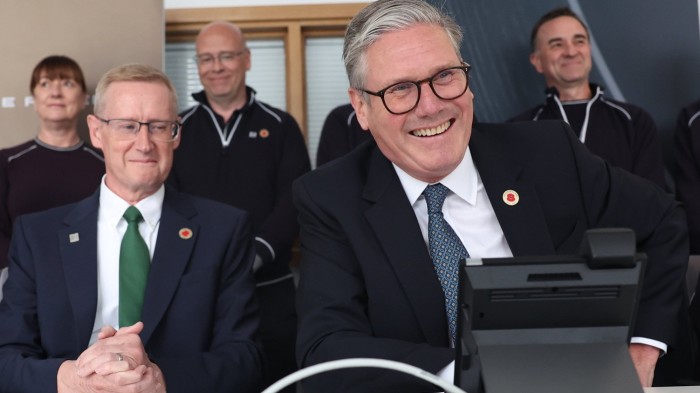Unlock the White House Watch newsletter for free
Your guide to what Trump’s second term means for Washington, business and the world
For Sir Keir Starmer it was a “really fantastic, historic day”: a moment of US-UK co-operation redolent of the moment 80 years earlier when the people of Britain hung out the bunting to celebrate the allied victory over the Nazis.
The reality was rather more prosaic: an accord between London and Washington, sealed in a surprise eleventh-hour phone call and delivered in chaotic circumstances, whose primary purpose was to limit the damage of Donald Trump’s global trade war.
The prime minister was watching his beloved football club Arsenal on television on Wednesday evening when he was required to break off the match: The US president was on the line.
British officials believed that the long sought-after deal was nailed down, but Trump was seeking two late concessions on agriculture. “We agreed to one of his demands and not the other,” said one British official.
The official White House factsheet boasted the deal would “dramatically increase access for American beef . . . and virtually all product produced by our great farmers”.
Wednesday’s call capped weeks of increasingly intense talks, with British officials shuttling to Washington to join UK embassy staff in negotiating the deal.
Aside from Lord Peter Mandelson — the UK ambassador to Washington who stood beaming in the Oval Office during the announcement — Starmer’s business relations chief Varun Chandra also played a key role in finalising the deal.
Starmer’s self-professed “calm and proportionate” response to Trump’s trade provocations — which included this week’s threat to impose tariffs on foreign films that would have hit Britain’s world-class production industry — was seen in London to have kept the talks on track.
But in the end, British officials concluded that Trump needed a trade deal as much as the UK. “The key thing for the Trump administration was to show the markets they can do a deal,” said one Starmer ally.
As the ink dries, there will now be scrutiny of whether Britain, in its rush to get a trade accord with America, has secured good terms compared with the other countries with which the US president is negotiating.
The rush extended to Thursday itself: Trump’s announcement that he intended to put Britain at the front of the queue for what he called a “full and comprehensive trade deal” caused an almighty scramble as Number 10 tried to rewrite Starmer’s programme.
The prime minister, who was scheduled to spend the day marking VE Day, was dispatched to a Jaguar Land Rover factory in the West Midlands, where he dialled in to the Oval Office on a landline phone to hear Trump announce the deal, which included concessions for UK carmakers.
Number 10 insisted it had not been blindsided by the announcement, but nevertheless accidentally sent journalists to the wrong JLR factory in Coventry, 13 miles away from the prime minister’s press conference in Solihull.
Starmer, in an extension of his prolonged and ultimately successful Trump charm offensive, recalled how exactly 80 years earlier the people of Britain were hanging out the bunting to celebrate the martial victory of UK and US forces.
“As VE Day reminds us, the UK has no greater ally than the United States,” the prime minister said.
Mandelson — standing alongside Trump in the Oval Office — got in on the act with a Churchillian flourish: “For us, this is not the end. It’s the end of the beginning.”
Mandelson, who is now seeking to develop a UK-US tech partnership, raised that prospect with US vice-president JD Vance on Thursday at the White House. “I’m there for you,” Vance replied, according to British officials.
Ultimately, Trump’s “full and comprehensive deal” was nothing like the ambitious UK-US free trade agreement envisaged by Brexiters after Britain left the EU in 2016, but it drew some of the sting from the US president’s trade onslaught, blunting the impact of tariffs on cars and pharmaceuticals while scrapping them on steel and aluminium.
For now, Starmer will win some plaudits for being the first world leader to do a deal with Trump since the president announced sweeping tariffs last month.
“If we can get a deal with India, Trump and the EU in the next three weeks, that would be the dream scenario,” one UK minister told the Financial Times on Monday.
Starmer agreed a trade deal with India on Tuesday, and a new post-Brexit UK-EU “strategic partnership” is due to be agreed at a summit in London on May 19, paving the way for deeper co-operation in defence and trade.
While the prime minister is struggling domestically — languishing in the opinion polls domestically and on the end of a drubbing in last week’s local elections — he seems keen to embrace the international stage.
Challenged whether the deal would still leave Britain’s trade relations with the US in a worse state than before Trump took office, Starmer insisted that was the wrong question. He replied: “You should be asking ‘is it better than it was yesterday?’”




